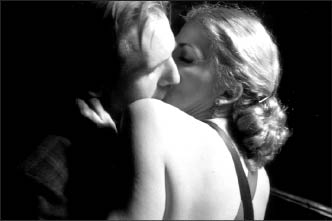Not the Orient Express: The White Countess
by George Sax

Ralph Fiennes has been making a career out of fine-edged suffering for some time now. In last year’s The Constant Gardner his suddenly widowed British diplomat was so apologetically repressed that his political awakening and heroic response to his wife’s murder were a little implausible.
Fiennes really started his film career in 1993 as the frighteningly intelligent, brutally twisted Nazi officer in Steven Spielberg’s Schindler’s List, still his most emphatically effective acting. But soon he was quietly enduring the physical and remorseful pains of The English Patient, followed by a series of film portraits of men contemplating moral dilemmas and spiritual jeopardy. He took a break from tortured introspection to appear opposite Jennifer Lopez in Maid in Manhattan, in which he seemed willing to get the hang of romantic comedy, even if he wasn’t entirely successful, but neither his co-star nor the material was much help.
Now Merchant-Ivory have given him another opportunity for politely suppressed inner malaise in The White Countess. (Producer Ismail Merchant, the life partner of director James Ivory, died while this film was being made.) Indeed, scriptwriter Kuzuo Ishiguro (whose novel The Remains of the Day was adapted by the same team ten years ago) and director Ivory have provided their central character, Todd Jackson (Fiennes), with afflictions so daunting that they challenge movie-consumer tolerance as much as they do Jackson.
Once an American diplomat who served at the League of Nations, Jackson is now blind and living a circumscribed but largely aimless existence in Shanghai in 1936. His sight was taken in the second of two terrible incidents that also robbed him of his family. (Both are badly managed by Ivory in brief flashbacks.)
Jackson’s situation is so pitiable that it’s a little disconcerting to realize that he’s not meant as some kind of extremist symbol of the human condition. As usual, Ivory’s intentions are more modestly pitched.
The former diplomat spends much of his time hanging out in the city’s bars and clubs dreaming of one day opening up his own watering hole, an elegant refuge from the disruption and pain of personal and social history.
In one dive, he meets a White Russian refugee working as a dance-hall girl, the former Countess Sophia (Natasha Richardson). When he wins a bundle at the racetrack, he invites her to become the titular, emblematic hostess of his soon-to-open place, The White Countess.
Most of the basic elements of the movie are irredeemably old-fashioned, seeming to echo a hundred routine products of the British and American film industries of the 1930s and ’40s, but the execution is both more and less than these sources’. Ivory’s long-established mode of plodding restraint doesn’t permit much historical pageantry or an emotional charge. He’s neither vulgar nor humanely insightful enough to, on the one hand, satisfy ordinary audiences’ ordinary desire for excitements, nor, on the other, to transcend generic expectations. White Countess moves in a kind of limbo, rather like its hero at the beginning of the movie.
It all seems to fit Fiennes’ approach, his taste for refined suffering, but that scarcely drives a movie. Richardson’s efforts are more to the point, but she’s too often marooned in the movie’s doldrums. (Vanessa Redgrave and several other very able performers are used carelessly.)
Ivory and Ishiguro may have intended a poignant melodrama about the inescapability of history and its occasional tidal-force changes, but White Countess is too enervated, too suggestive of aesthetic and political fatigue, to bring this off.
|
Issue Navigation> Issue Index > v5n4: Police Story: Inside the Buffalo Police Department (1/26/06) > Film Reviews > Not the Orient Express: The White Countess This Week's Issue • Artvoice Daily • Artvoice TV • Events Calendar • Classifieds |









 Current Issue
Current Issue